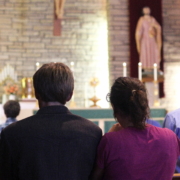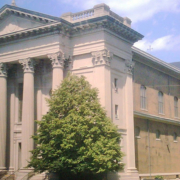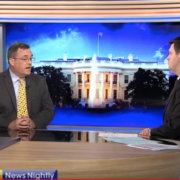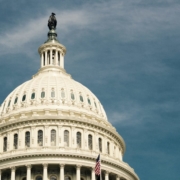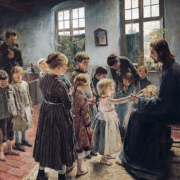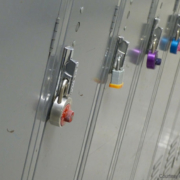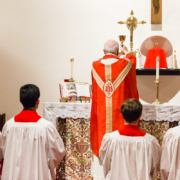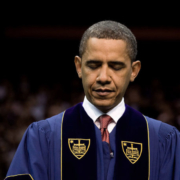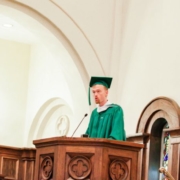The following is adapted from the commencement address delivered by Mr. Thomas Cole, M.A., M.T.S., at Holy Spirit Preparatory School in Atlanta, Ga, on May 24th, 2019. Mr. Cole is the chairman of the theology department at Holy Spirit and was chosen to be the commencement speaker by the graduating class.
Be a Teacher
I am immediately struck by the responsibility and unique honor it is to deliver an address of this sort. Typically, from what I have observed, the speaker so honored is famous, and famous beyond the confines of their own community. A big name seems to impress and add to the solemnity of the occasion.
In my case, however, I am immediately reminded of a conversation in Robert Bolt’s brilliant play about St. Thomas More, A Man for All Seasons. Those familiar with the work may recall the conversation between Thomas More, then Chancellor of England. and the man who would ultimately betray him and commit perjury to secure his execution: Richard Rich. It begins with the saint urging the young man to a career in education:
“Why not be a teacher?” St. Thomas More asks, “You’d be a fine teacher. Perhaps even a great one.”
“And if I was, who would know it?”
“You, your pupils, your friends, God. Not a bad public that…” [1]
Not a bad public, this. So much for my fame.
On the Shoulders of Giants
If I don’t have fame to add luster to this occasion, hopefully I have at least some wisdom to share to benefit the graduating class, at whose request I stand before you…
John of Salisbury, 12th-century Bishop of Chartres in France, in his medieval work, the Metalogican, recalls that, “Bernard of Chartres used to compare us to dwarfs perched on the shoulders of giants. He pointed out that we see more and farther than our predecessors, not because we have keener vision or greater height, but because we are lifted up and borne aloft on their gigantic stature”[2] Hence, if I have any real wisdom here, it is that I am like that dwarf on the shoulders of giants.
What is my advice, then, to this graduating class?
Seek the truth, do the good, love the beautiful. In all things, love. “Let me explain. No, there is too much. Let me sum up.”[3]
Truth
Let us begin with truth. “Quid est veritas?”[4] In his interrogation of Jesus Christ, Pontius Pilate asks this question. “What is truth?” Many struggle to answer this fundamental question of reality.
Our Holy Spirit graduates are not so lost as to how to respond. If I might take the liberty of putting them on the spot: graduates, what is truth?
St. Thomas Aquinas in his Summa Theologiae, says the, “truth is defined by the conformity of intellect and thing.”[5]
This is absolutely essential to our understanding of the intellectual life and our meaning as human persons. If we think about it, truth is conformity to the “thing,” that is, with the reality external to us. Truth is not about bending reality to conform to our perspective, preferences, or priorities – it is about us having the humility to realize that to possess the truth is to come to understand and orient ourselves to the real world; to existence itself.
Our world tells us that we can be whatever we want; I fear that is the lie of the Garden of Eden, “you yourselves will be like gods.”[6] I hate to be a downer on your graduation day, but the reality is that you can’t be whatever you want. You can certainly choose your occupation – but you can’t choose who and what you are by nature.
In the end, you can either be what you are made to be – a creature conforming to the order of reality – or you can make of yourself a god, and set out in defiance of reality to be whatever suits your fancy.
The truth, which we know through both faith and reason, is that we are made to know and love God – in order to be saint. Knowledge of the truth of Him who is “the Way, Truth, and Life”[7] makes it possible for us to achieve our purpose and ultimate happiness.
Class of 2019, seek the truth.
Goodness
Now for goodness. “It belongs to every virtue to do good and avoid evil,”[8] St. Thomas Aquinas informs us with his customary clarity. Virtue! A word we mention here at Holy Spirit – indeed, we speak of our core virtues of Faith, Prudence, and Magnanimity. Faith, a theological virtue whereby we believe in God and what He has revealed; Prudence, the cardinal virtue whereby we know what ought to be done, and do it; and Magnanimity, that part of the cardinal virtue of fortitude whereby we have the courage to strive after moral greatness.
As wise men back to Aristotle note, virtue is a habit of right moral action. The Catechism calls it, “an habitual and firm disposition to do the good.”[9]
As an aside, I rather object to imprecision like we find on the bumper sticker that reads, “practice random acts of kindness.” Random acts of kindness? Who wants to be randomly kind? If it is worth being kind, we need to be consistently and habitually kind.
Do remember that even little things add up – consider the $4 of a cup of coffee. That cup 300 days of the year – taking off two months – costs $1,200. Repetition does make a difference. And repetitive goodness makes a difference.
The goodness I want in you, class of 2019, is that habitual goodness; goodness that is second nature. It is only with such goodness that you will have the character to become that saint that, in truth, you know you are meant be. As St. Robert Bellarmine notes, “a good death depends upon a good life.”[10]
Let me tell you a story about goodness: back in Northern Virginia, where I finished my education and taught for ten years, I knew a devoutly Catholic family, the Vander Woudes. The father of that family, Thomas Vander Woude, was a good man. Good in that rich sense of which I have spoken.
Let me read the opening of a Washington Post article about him:
If you ever ran into Nokesville dad Thomas S. Vander Woude, chances are you would also see his son Joseph. Whether Vander Woude was volunteering at church, coaching basketball or working on his farm, Joseph was often right there with him, pitching in with a smile….[11]
I remember seeing them around, myself. Joseph, or Josie, is the most cheerful fellow you will ever meet; Josie has Downs Syndrome. He was about 20 years old in 2008 when this article was written. It continues,
Vander Woude, 66, had gone to Mass at Holy Trinity Catholic Church in Gainesville on Monday, just as he did every day, and then worked in the yard with Joseph, the youngest of his seven sons, affectionately known as Josie. Joseph … fell through a piece of metal that covered a 2-by-2-foot opening in the septic tank.…
At some point, Vander Woude jumped in the tank, submerging himself in sewage so he could push his son up from below and keep his head above the muck, while Joseph’s mom and the workman pulled from above.
When rescue workers arrived, they pulled the two out, police said. Vander Woude, who had been in the tank for 15 to 20 minutes, was unconscious. Efforts to revive him were unsuccessful, and he was taken to a hospital, where he was pronounced dead, police said.
… For those who knew him, Vander Woude’s sacrifice was in keeping with a lifetime of giving.[12]
I remember the multitudes that passed by during the viewing of Mr. Vander Woude at Holy Trinity parish to pay respects to this hero. I know, because I was among them. This was a good man. A virtuous man.
What gave him the strength to jump into such filth? When faced with the moment of crisis, he was able to draw on what was already a habit – a virtue – of self-sacrifice, of goodness. This was no random act!
Class of 2019, do the good.
Beauty
Why do I bring up such a sad story on such a joyous occasion? Quite simply, because – to the Christian – it is a beautiful story. With the eyes of Faith, we see the sorrows and sufferings of this world in their larger context. Why is Good Friday so good? Easter. Have you ever wondered why we typically celebrate the feasts of saints on the day that they died? Actually, come to think of it, did you know that we typically celebrate the feasts of saints on the day that they died? The Roman Martyrology refers to that day as their “birthday.” Why?
It is on that day that they were born into the glory of the Beatific Vision – ultimate happiness and the very purpose of our lives! A beautiful is the soul born to eternal life. We are able to echo St. Paul, “Where then, death, is thy victory; where, death, is thy sting?”[13] For only sin gives death its power, as St. Paul reminds us; only our free will choice to reject God in sin do we find in death nothing more than punishment and despair.
Our world is intoxicated with pleasure and self-gratification; enslaved to the false promises of sin. You can see it too often in our arts; when reduced to nothing more than self-expression or as monuments to our own pride, they become ugly and signs of despair. When we look to ourselves for the meaning of reality, we fall back into the error of Eden. There is nothing beautiful about narcissism, and too much of modern art proves that point so eloquently. Our world is awash in ugliness.
On the other hand, where you find truth and goodness together, where you find them in a way that is whole and proportional, you find something that is striking and pleasing: you find real beauty, even in the midst of suffering or hardship.
Beauty, especially the beauty of truth and goodness, but also, in a particular way, beautiful art – like what we saw in abundance in Rome — beautiful music, or beautiful literature conveys something true about our world in a manner that compels; it teaches us goodness in a way that inspires. Our world is starved for beauty! In the end, “our hearts are restless until they rest” in God, to paraphrase St. Augustine of Hippo.[14]
Class of 2019, love the beautiful.
Love
In the end, truth, goodness and beauty find their fulfillment in love. Our Divine Lord instructs us: “This is my commandment, that you should love one another, as I have loved you. This is the greatest love a man can shew, that he should lay down his life for his friends; and you, if you do all that I command you, are my friends.”[15]
We are called to love. This is not the love of sappy sentimentality, the pop song, or the selfie. This is the self-sacrificial love of keeping the commandments in a life of virtue; the love of a parent that tends to a sick child in the middle of the night, a friend who cancels his social plans to visit a buddy in the hospital, a missionary who leaves home and family to preach the gospel to strangers, a martyr who offers up his life for the faith. A Thomas Vander Woude, who dies to save his son.
If your love is authentic, it will be true, good, and surely beautiful.
Class of 2019, love!
Models and Humor
I leave you with two final practical points in living this out:
First, find heroes, find role models, and spend time with those that will build you up, not break you down. The great biographer of the saints, Fr. Alban Butler, rightly notes that:
The method of forming men to virtue by example is, of all others, the shortest, the most easy way, and the best adapted to all circumstances and dispositions…[i]n the lives of the saints we see the most perfect maxims of the gospel reduced to practice, and the most heroic virtue make the object of our sense, clothed as it were with a body, and exhibited to view in its most attractive dress. [16]
Finally, never forget to have a sense of humor; a humble and joyful sense of humor – not a sneeringly cynical one! St. Teresa of Avila, the Spanish Carmelite and Doctor of the Church is said to have prayed, “From silly devotions and sour faced saints, deliver us, O Lord.”
Conclusion
I will close by quoting Bishop Robert Barron, auxiliary of Los Angeles, who gave a commencement address earlier this month focused on the virtue of magnanimity:
You are meant to go forth, carrying what you have received and cultivated here, in order to sanctify our suffering world. Is this an arduous task? Yes! But magnanimous people like arduous tasks, for they are ordered to the moral work that will give the highest honor. [17]
Holy Spirit class of 2019, go, take the light of what you have learned and begun here at Holy Spirit Prep into our increasingly dark world. Our world needs those that in living sacrificial love, manifest the true, good, and beautiful. Those who seek to serve and not be served. I mean it most sincerely when I say: I know that you are up to this sublime challenge!
Come Holy Spirit and congratulations to the class of 2019!
[1] Robert Bolt, A Man for All Seasons, Act One, pg. 8.
[2] John of Salisbury, Metalogicon, Bk III, (translated by Daniel McGarry, UC Press, 1955), 167.
[3] Line from the motion picture, The Princess Bride.
[4] John 18:38.
[5] St. Thomas Aquinas, Summa Theologiae, I, q. 16, a. 2.
[6] Genesis, 3:5.
[7] John 14:6.
[8] Aquinas, STh, II-II, q. 79, a. 1.
[9] Catechism of the Catholic Church, 1803.
[10] St. Robert Bellarmine, The Art of Dying Well (Sophia Institute edition), 5.
[11] Jonathan Mummolo, “Father Who Died Saving Son Known for Sacrifice,” Washington Post, 10 Sept 2008.
[12] Ibid.
[13] 1 Corinthians 15:55.
[14] St. Augustine, Confessions, Bk I.
[15] John 15:12-14.
[16] Alban Butler, Butler’s Lives of the Saints, Introduction, (Notre Dame, IN: Christian Classics, 1956), xiii-xiv.
[17] Bishop Barron, Commencement Address at Thomas Aquinas College (CA), 11 May 2019. https://thomasaquinas.edu/news/bishop-barron-commencement-address-2019

